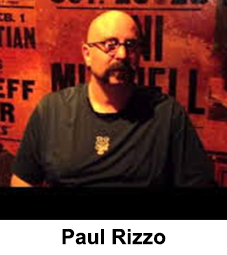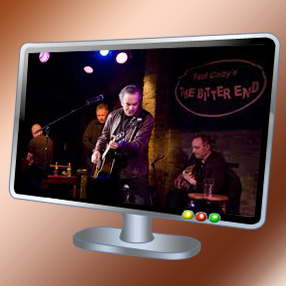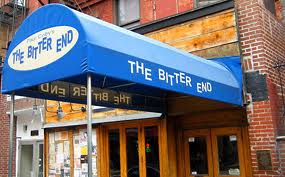Today’s blog is the next installment on the “If You Televise It, Will They Come?” series.
Part I-IV of the series appeared in blogs #55-#58.
The first four blogs of this series focused on the expanding presence of streaming technologies in clubs, particularly jazz clubs, not just in the United States, but also globally. We first described the activities of Brian Gruber’s http://showgo.tv/. We then investigated the probable outcomes of televising live events by comparing streaming live performance to sports events. The conclusion is: if you televise it, they will come.
We interviewed Spike Wilner, co-owner and manager of the famed Smalls Jazz Club in New York City’s Greenwich Village about their exploration into video streaming, then Daniel Gallant, Executive Director of the Nuyorican Poets Café on Manhattan’s Lower East side about the Nuyorican’s streaming activities. This week’s blog focuses on the highly successful  Bitter End, a rock-oriented club in New York City’s Greenwich Village and its business manager Paul Rizzo.
Bitter End, a rock-oriented club in New York City’s Greenwich Village and its business manager Paul Rizzo.
Paul Rizzo is a former bartender, who did lighting design on the side when he was a business major student at Stonybrook, a four-year college, which is part of the State University of New York. The Bitter End was founded in 1961 and has been host to multitude of young performers who today are legendary: Lady Gaga, Bill Cosby, Bob Dylan, Jon Stewart, Richard Pryor, Joan Rivers, Etta James, Norah Jones, Billy Joel, Tracy Chapman, Stevie Wonder and Neil Young, among them.
Streaming came to The Bitter End about a decade ago. A company called CollegeMusic.com approached the club 10 years ago to use video streaming as a way of capturing performances on video cassette. The plan was they would archive it and then sell it. Soon after, however, CollegeMusic.com unexpectedly closed its doors. Rizzo didn’t even get a call. They stopped coming to pick up the video cassettes. A friend of Rizzo’s in the computer business, who happened to share the same server as CollegeMusic.com, told him that CollegeMusic.com had gone out of business.
Rizzo continues the story: “All of a sudden I had all this equipment. So I called someone who worked at the Village Gazette and he created a player that we could use online and stream ourselves on our web site. It would come up with their Village Gazette ad on it and there would be our stream. And that’s how we started.
“Then I was approached by the guy who was with CollegeMusic.com originally and we started talking about monetizing it since I wasn’t making any money on it. Frankly, it was never about the money. I was limited to about 25 viewers at a time because it was a very low stream.
“I didn’t want to put a T-1 line in. I didn’t want to invest money into it because there was no money coming back from it. This was way back when everything was a little antiquated and it wasn’t up to where it is now where streaming is standard. There were no smart phones, everyone was still using flip phones. It was only on the computer. So this guy gave me the computers, he created the streamer I use now and we started streaming.”
The Intellectual Property Rights Issue
 My conversation with Rizzo almost immediately gravitated towards intellectual property rights:
My conversation with Rizzo almost immediately gravitated towards intellectual property rights:
“A good friend of mine is an intellectual properties lawyer and I started to talk to him about the monetization of the stream. He basically told me ‘If you want to be the one to break through, it will cost you hundreds of thousands of dollars in legal fees, but you’ll probably win the case. And you’ll be the one that breaks the barrier to video archive and streaming, because right now it’s illegal to do it.’ Technically it’s not illegal to stream, but it’s illegal to archive because of the video rights are different than audio rights.
“I pay BMI, ASCAM and SESAC to stream audio, which is the audio aspect of it. And they cover the rights on that. But video representation doesn’t go through them. Video representation goes through the artist. You can’t have a video representation of a song without the artists’ permission. So when I have a band that has a cover song [a piece of music originally created and performed by someone else], technically I’m not supposed to stream because, for instance, I don’t have Bob Dylan’s permission to stream ‘Blowing in the Wind.’ But it’s not being archived and no money’s being made so there’s no monetary gain. No one was gaining anything that way, so no one ever said anything to me because I was never making money.
“This is the first thing to look at with streaming. It’s out of respect to the artist. We give 100% of the door to the artist. We make money on the drinks. It’s all about people making money. There’s enough for everybody. That’s why we’ve been here for so long.”
I asked Rizzo how he was covering the copyright issue. He replied: “I’m not. No one really complains. I’ve never had an issue because there’s no monetary gain. I’m not selling ads. I’m not making money on the thing. I’m not archiving it. It’s not being archived for future use. It’s just being streamed.
“Now I’ve been told by some people, including Brian Gruber of Showgo.tv, that that’s not as much of an issue if it’s just being streamed. A lot of people will write in their contract ‘no video streaming.’ I’ll shut it off if someone wants me to shut it off. I have musicians that in their contract it says no audio or video recording.
The Focus on the Music vs. Television
“We are here about the music. That’s all that’s in here. Look around the room. It’s a stage and that’s it. It’s a big stage and a grand piano that gets tuned every week. We have bigger stage than most for a small room.
“There are no televisions in here. There’s no baseball games. There’s no anything else. However, I actually just bought video screens. They’re putting in retractable video screens because I’ve got to do something that doesn’t run during the bands. If I’m really crowded, maybe I’ll lower them down behind the bar and do the video stream, so people can see what’s going on  the stage. But there’s a small delay between the video stream and what’s going on, so that doesn’t always work.”
the stage. But there’s a small delay between the video stream and what’s going on, so that doesn’t always work.”
Monetizing the Stream
I asked Rizzo what would push him over the line to monetize the streaming? He replied:
“What would push me in that direction is if it were done legally. The guy who put me in the technology said just keep doing it and when we get sued, we’ll stop. But I don’t want to do that. I’m not about screwing the bands.
“I think I max out at 40 or 50 people in the streaming audience. That’s one of the reasons why I got involved with Brian Gruber’s Showgo.TV. I think he can bring me to a larger audience and he’s more involved in the technology. He’s actually taking my stream until his cameras go up. But there are certain things I won’t stream, like when I know there will be a night of cover bands, I won’t stream it. It might not be the quality I want to stream, but also I know it’s all going to be covers, so why even deal with it. The first thing I asked Gruber was ‘what about the legal aspect?’ And he said ‘we’re working on it.’
The Future of Club Streaming
“A lot of clubs are starting to do it. But people don’t like to do something unless they can make money. They don’t like to risk anything. There are clubs that are music oriented and there are clubs that are everything oriented. There’s video everywhere now. A lot of clubs have televisions now, a lot of clubs show sporting events. There are very few clubs that specifically do music. And the ones that specifically do music will probably stay doing music. However, if video streaming is to be effective, the intellectual property rights issues will have to be worked out.”
Conclusions
There are at least two general conclusions that can be drawn from the interviews in the last five blogs (including this one). First, as stated previously, if you televise it, they will come. In other words, contrary to initial perceptions, televising an event encourages people to experience the real thing, the live event.
Second, the intellectual property rights issue brings home the relationship among art, technology, and the law. Just on an anecdotal basis, it appears first, art—here meaning the broad spectrum of the fine and performing arts—finds its way into the larger society through its relationship with technology. This combination, in turn, has an impact of social behavior. Only when the evolved social behavior is prevalent enough do the laws of the land change. In the context of this blog, only when there’s a critical mass of clubs streaming and archiving live performances and enough musicians (and their attorneys) complain loudly about the copyright and attendant monetization issues will the copyright laws be adjusted. I believe it was Supreme Court Justice Oliver Wendell Holmes who pointed out that the law always follows social behavior—it’s not the other way around.
Please write to me at meiienterprises@aol.com if you have any comments on this or any other of my blogs.
Eugene Marlow, Ph.D.
June 3, 2013
© Eugene Marlow 2013


